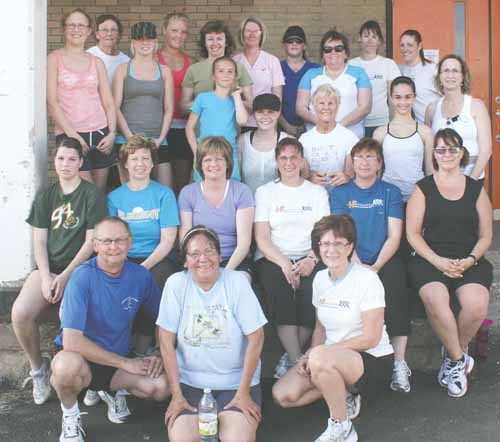The Health Foundation's Charity Road Race Learn to Run clinics have been well underway for over a month and the turnouts at each clinic seem to be getting bigger.
Each Tuesday and Thursday beginning at 5:45 p.m., participants meet at the Yorkton Regional High School track.
According to the Health Foundation, clinics are designed for both the beginning runner or for those who wish to prepare to walk in the Charity Road Race in August.
Clinics feature nutrition education, stretching and pacing during a race.
Jillian Wlock, registered dietitian, gave a speech recently at the Learn to Run clinic and included a portion on healthy eating and appropriate drinking.
"Chocolate milk is great," she said. "It does have a little bit of protein."
She said it has an advantage over water because there isn't any protein in water, she said.
"It's always been a healthy option," she said of chocolate milk. (Because) it gives you that protein option.
Wlock said it's a good choice as a post-exercise option, adding that there's "none in Gatorade".
Some nutritionists have criticized chocolate milk mainly due to its high sugar content and its relationship to childhood obesity.
"There's always been a lot of confusion over what people should eat," she points out.
However, a study published in 2006 indicated that chocolate milks aids in recovery when taken after intense athletic workouts. It suggests that this is likely due to its ratio of carbohydrates to protein, among other nutritional properties.
It's important to try and replace the water you lose when you sweat. There is no one fluid volume that is ideal for all exercisers as everyone sweats at different rates.
Remember to sip water, as opposed to drinking in gulps, before, during and after physical activity, but remember to not overdo it. Overdrinking can lead to hyponatremia.
Sports drinks/gels aren't usually needed unless you are training for an event that will take over 90 minutes to complete.
Sports drinks provide fluid, carbohydrates and electrolytes in order to help replace fluid and they help to provide a quick source of energy and help reduce losses of sweat.
The safety of using energy drinks is in question. High sugar levels and the carbonation can result in an upset stomach.
Three rules to follow for utmost health include: drinking plenty of water and other fluids, follow Canada's Food Guide and limit nutrient-poor foods.
Other guidelines include: have a small meal or snack a few hours before a workout (some fluid, mostly carbs, some protein, and a little fat).
After exercising, it is highly recommended to take in any number of snacks/drinks, including a handful of almonds, small, whole grain pita and chocolate milk.
Vitamin and mineral supplements, such as water with added vitamins are not needed to get the most out of a workout. Eating well within Canada's Food Guide provides the needed vitamin dosage for regular exercise.




